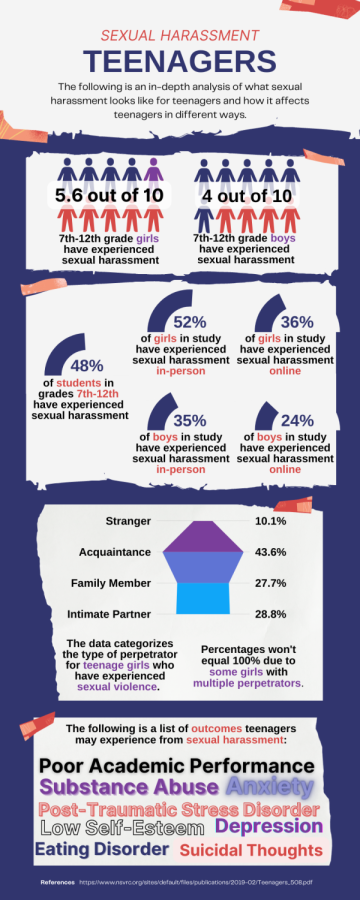Sexual harassment common in school environment
Sexual harassment has recently become a more prevalent topic in society and schools around the world are proving to not provide safety from it.
“[Sexual harassment is] way too common for this day and age,” senior Grace Hutchinson said. “I could be walking down the hallway and somebody [could] catcall me, like it’s happened walking from [choir] to the bathroom. I’ve literally had somebody yelling at me [saying]: ‘You’re looking good today girl … Shake some ass for me’ … They think you’ll take it as a compliment. It’s not a compliment. You don’t want it.”
According to the U.S. Equal Employment Opportunity Commission, the definition of the phrase sexual harassment is “unwelcome sexual advances, requests for sexual favors and other verbal or physical harassment of a sexual nature.” In other words, when someone makes an unwanted comment about another’s body in a sexual, derogatory way, the person is participating in sexual harassment.
“I don’t need your approval. I don’t need you to tell me that I’m looking good,” Hutchinson said. “I know that I look good. I don’t need you to tell me that and I don’t want you to tell me that because I did not dress for you, I dress for myself.”
Catcalling isn’t the only form of sexual harassment Hutchinson has encountered in a school environment. In her sophomore English class, Hutchinson was targeted by a male peer when she had stepped outside of the classroom. The student announced to the class that he wanted to do “unruly things” to her, and according to Hutchinson, she later heard about it from a friend.
“I remember [I] texted my mom after I found out about it and I [said]: ‘You have to come pick me up from school … I can’t be here anymore,’” Hutchinson said. “I just stayed home for the weekend and I didn’t really leave my room and that was … the first time I had really been just … totally depressed and … I [couldn’t] be around people. That was … my first experience with a real episode of depression.”
Hutchinson reported the incident to administration and according to her, “he got lunch detention” and nothing more.
“Lunch detention is what you get when you bring a knife to cut a cake with, [which] you shouldn’t have,” Hutchinson said. “It’s not ‘I told this girl I wanted to have sex with her in front of the entire class.’ [Administrators] just need to respond with more of a punishment, like in-school suspension or out of school suspension, just something that maybe separates them [from the other person] for a while so it’s not like you’re staring this in the face every day.”
On the counselor and teacher side of the response, Hutchinson received support that helped her distance herself from the student and work through her mental health impacts.
“My teacher, [Sara] Rapp, was super helpful and super nice about it,” Hutchinson said. “[She said]: ‘I won’t put you in a group with him anymore. I won’t make you sit next to him … I will do whatever makes you feel comfortable.’”
At the moment, a student can receive support by reporting an incident of sexual harassment via the grievances forms found throughout the school and in many classrooms. Additionally, talking to a counselor or administrator directly will allow the school to take action – if the person chooses to formally report the incident – and support the person.
“[Remember that] it’s not about you, so you shouldn’t take it to heart,” Hutchinson said. “It’s them thinking that they can say whatever they want to say … You are beautiful and strong. You don’t need their approval … You are worthy of love that’s not [that] kind of interaction. [What they said] is not what you are. [Their words are] not the sum of you.”












